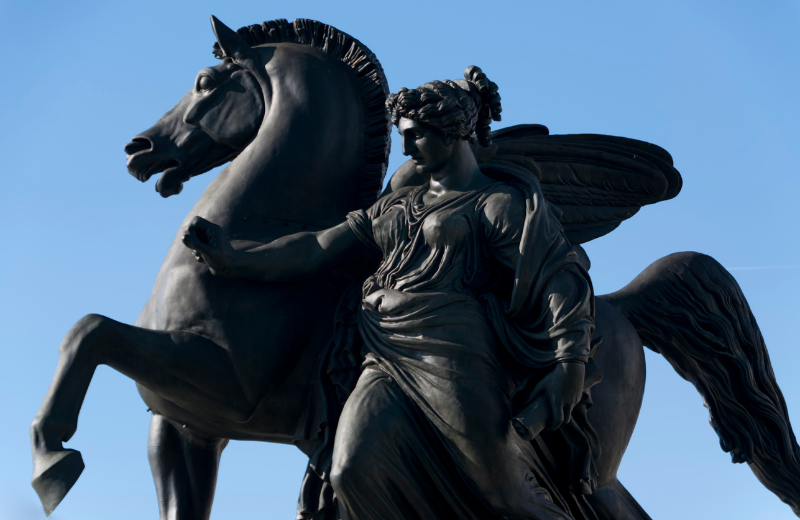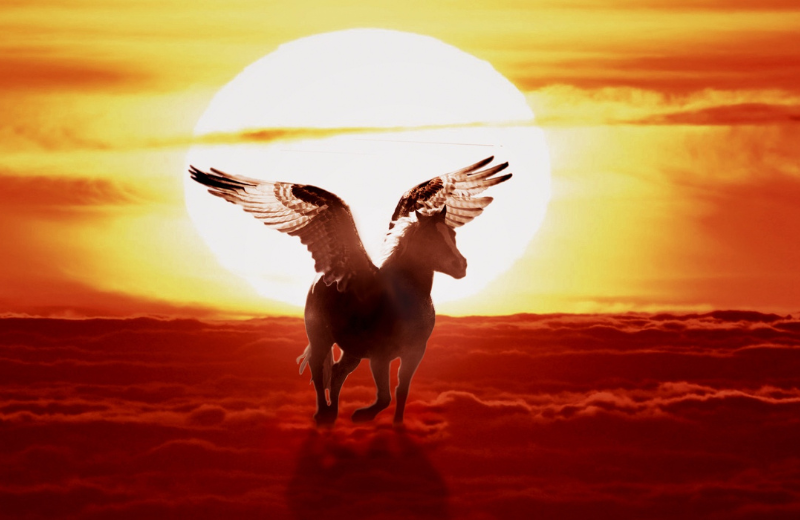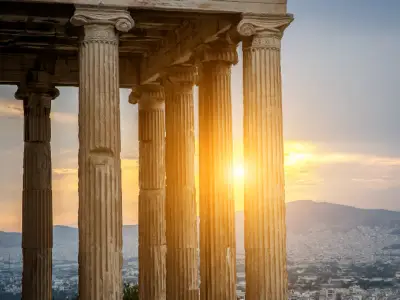Pegasus is one of the most famous and enduring figures in Greek mythology, known for his striking appearance as a winged horse and his connection to the Olympian gods and heroes of ancient Greece.
But what is the true story behind Pegasus? Let’s explore the myths, powers, and symbols that surround this fascinating figure.
Jump to:
- Who is Pegasus in Greek Mythology?
- What is Pegasus the God of?
- The Myths and Legends of Pegasus
- The Symbols of Pegasus
- What Powers Does Pegasus Have?
- Pegasus' Relationships, Children, and Family Tree
- The Moral of the Story: Lessons from Pegasus
- Pegasus' Worship and Legacy
- Frequently Asked Questions About Pegasus
- Study Greek Mythology for £29
Recommended for you!
Best SellersWho is Pegasus in Greek Mythology?
Pegasus is a mythical creature in Greek mythology, often depicted as a beautiful white winged horse. He was born from the blood of Medusa, the Gorgon, after she was slain by the hero Perseus. Pegasus emerged from the earth, fully grown and ready to take flight. He was a creature of divine origin, blessed with extraordinary abilities.
What is Pegasus the God of?

While Pegasus is not a god in the traditional sense, he plays an important role in the service of the gods, particularly Zeus, the king of the gods. After his adventures on earth, Pegasus was granted a place among the stars as a constellation. He also had the important duty of carrying Zeus' thunderbolts, further cementing his connection to the heavens.
The Myths and Legends of Pegasus
The Birth of Pegasus
The story of Pegasus begins with his remarkable and dramatic birth. When the hero Perseus beheaded the Gorgon Medusa, her blood mixed with the earth, and from this mixture, Pegasus and his brother Chrysaor emerged. This extraordinary moment marked Pegasus as a creature of divine origin, born from one of the most feared monsters in Greek mythology.
Pegasus and Bellerophon
Perhaps the most famous story involving Pegasus is his partnership with the hero Bellerophon. Bellerophon, seeking to defeat the fire-breathing Chimera, was given the task of taming Pegasus. With the help of the goddess Athena, who provided him with a golden bridle, Bellerophon succeeded in capturing Pegasus.
Together, they soared through the skies, and with Pegasus' speed and power, Bellerophon was able to slay the Chimera. Their partnership, however, came to a tragic end when Bellerophon, full of hubris, attempted to ride Pegasus to Mount Olympus. Angered by this act of arrogance, Zeus sent a gadfly to sting Pegasus, causing the horse to throw Bellerophon back to earth, where he lived out the rest of his life in disgrace.
Pegasus' Ascension to the Stars
After his time with Bellerophon, Pegasus continued to serve the gods, most notably Zeus. Pegasus became a trusted steed for the king of the gods, helping him carry thunderbolts. As a reward for his loyalty and service, Zeus eventually immortalised Pegasus by placing him in the sky as a constellation. This act ensured that Pegasus would be remembered for eternity, flying forever across the heavens as a symbol of divine inspiration and freedom.
The Symbols of Pegasus

Pegasus is rich with symbolic meaning, and his image has been used throughout history to represent several powerful ideas:
- Freedom and Aspiration: As a winged horse, Pegasus symbolises the ability to rise above earthly limitations and soar towards the divine. He is often seen as a symbol of personal freedom and the pursuit of higher aspirations.
- Divine Inspiration: In later mythology, Pegasus became associated with the Muses, the goddesses of art and creativity. As such, Pegasus represents artistic inspiration and the creative process.
- Connection Between Earth and Sky: Pegasus’ ability to fly symbolises the link between the mortal realm and the divine, serving as a bridge between humans and the gods.
What Powers Does Pegasus Have?
Pegasus is known for his extraordinary abilities, and these powers have made him an iconic figure in Greek mythology:
- Flight and Freedom: Pegasus is most famous for his ability to fly, allowing him to travel freely between the earth and the heavens. His wings symbolised freedom and his power to rise above earthly limitations, helping both gods and heroes on their journeys.
- Strength and Speed: In addition to flight, Pegasus was incredibly strong and fast, making him an ideal companion in battles and heroic quests. His speed allowed him to cross vast distances swiftly, which was crucial in many of his mythological feats.
- Summoning Thunder and Lightning: In some myths, Pegasus possessed the power to summon thunder and lightning for Zeus, adding a further divine element to his abilities. This unique power connected Pegasus even more closely to the gods.
Pegasus' Relationships, Children, and Family Tree
Pegasus’ origins in Greek mythology are fascinating, tying him to both divine and monstrous figures.
- Parentage: Pegasus was born from the blood of Medusa, the fearsome Gorgon, after she was slain by Perseus. His father was the sea god Poseidon, making Pegasus a unique blend of the terrestrial, aquatic, and divine realms.
- Siblings: Pegasus had one notable sibling, Chrysaor, who also emerged from Medusa’s blood. Unlike his winged brother, Chrysaor is depicted as a giant warrior, and while his story is less famous, he is an important figure in Greek myth. The two brothers, born from the same event, represent contrasting figures—one a noble winged horse, and the other a fearsome warrior.
- Romantic Relationships: Unlike many figures in Greek mythology, Pegasus did not have a wife or engage in romantic relationships. His story revolves around his service to the gods and his role in heroic adventures rather than familial ties.
- Children: Pegasus did not have children, as his narrative is focused on his divine duties. He is more known for his involvement in the lives of gods and heroes, cementing his place in Greek myth as a creature of power and loyalty, rather than familial legacy.
The Moral of the Story: Lessons from Pegasus

The story of Pegasus teaches valuable lessons about humility and ambition. While Pegasus was a creature of great power, his story is closely tied to that of Bellerophon, whose hubris ultimately led to his demise. The myth reminds us that while striving for greatness is admirable, overreaching can lead to downfall.
Pegasus also symbolises the potential for inspiration and the pursuit of higher ideals, encouraging us to rise above our limitations while remaining humble and respectful of the powers that be.
Pegasus' Worship and Legacy
Though Pegasus was not worshipped as a god, his legacy is deeply ingrained in the lasting stories and imagery of Greek mythology. Pegasus has inspired countless works of art, literature, and symbolism throughout history, often representing creative inspiration and the divine connection between mortals and the gods.
In modern culture, Pegasus remains a popular figure in literature, films, and corporate branding. His image is widely recognised and continues to symbolise the pursuit of greatness and the ability to transcend limitations.
Recommended for you!
Best SellersFrequently Asked Questions About Pegasus.
Is Pegasus still alive?
In Greek mythology, Pegasus was immortalised by Zeus when he placed him in the sky as a constellation. In this sense, Pegasus continues to live on in the stars as a symbol of his divine nature and eternal legacy.
What does Pegasus mean in English?
The name Pegasus comes from the Greek word "Pēgasos," which is believed to be related to the word for a spring or fountain. This name reflects Pegasus’ connection to water, as his father, Poseidon, was the god of the sea, and in some myths, Pegasus is linked to the creation of sacred springs.
Was Pegasus considered a hero?
Pegasus himself was not considered a hero but rather a companion and aide to heroes like Bellerophon. His role was to assist in heroic quests by offering his strength, speed, and flight to help heroes achieve their goals.
What is the spiritual meaning of Pegasus?
Pegasus symbolises freedom, inspiration, and spiritual ascent. In many spiritual traditions, Pegasus represents the idea of rising above the material world and connecting with the divine. His wings are seen as a metaphor for spiritual elevation and transcendence.
Did Perseus ever ride Pegasus?
Despite the popular misconception in modern retellings, Perseus never rode Pegasus in the original Greek myths. Instead, Pegasus was more closely associated with Bellerophon, who tamed and rode him during their adventures.
Why is Pegasus depicted as white?
In Greek mythology, white is often associated with purity, divinity, and power. Pegasus’ white colour symbolises his celestial origins and his close ties to the gods, particularly Zeus.
Study Greek Mythology for £29
Interested in learning more about Greek mythology and the incredible stories of gods, heroes, and mythical creatures like Pegasus? At Centre of Excellence, you can enrol in our Greek Mythology Diploma Course for just £29. This course offers a look at the fascinating world of ancient Greece, exploring the myths and legends that have shaped Western culture for centuries.





















